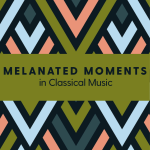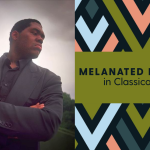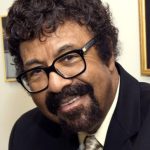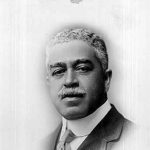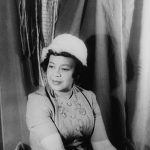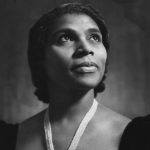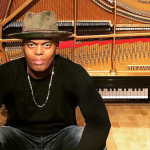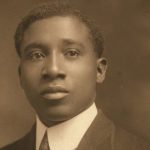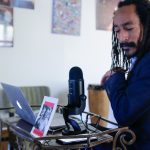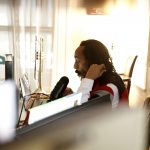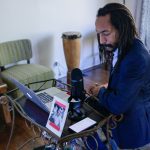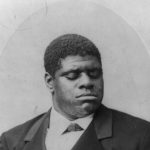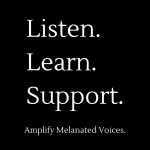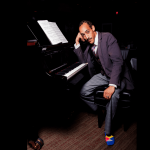Melanated Moments, S2E6: Variations on Vodou – Ric’key Pageot
Joshua and Angela welcome acclaimed and multifaceted performer Ric’key Pageot to the show. He speaks about his recent journey to explore his Haitian heritage and discover an impressive trove of classical music inspired by a legacy of Vodou and revolution. They discuss an amazing piece by Haitian-born composer Carmen Brouard entitled Baron la Croix.
Featured Music:
“Baron la Croix,” by Carmen Brouard, performed by Orchestre symphonique de Montréal
Music Plays (00:05): [MMCM Theme] Joshua Thompson (00:15): Hello everyone and welcome back! I’m Joshua Thompson… Angela Brown (00:19): And I’m Angela Brown. And this is Melanated Moments in Classical Music. You know, Joshua, this podcast continues the mission of highlighting musicians and composers of African descent who lived and exist in the diaspora of the mother continent. Joshua Thompson (00:39): That is absolutely right! And while Angela continues to use $500 words like diaspora… Angela Brown (00:44): Uh huh. Joshua Thompson (00:44): I’m going to set the stage for today’s episode, that includes a global or diasporic artist who is reconnecting with his roots, via another composer who provides a soundtrack to the modern political history of their shared homeland in Haiti. Angela Brown (01:04): There you go, being a ‘blerd’ again! That’s a Black nerd, for you people that didn’t know! Who we got on deck today, boo? Joshua Thompson (01:11): Well on today’s show, we have pianist, accordionist– and honestly, I didn’t know I cared about the accordion until I heard this man– producer, composer and bandleader: Ric’key Pageot. Angela Brown (01:24): Wow. Joshua, I know you excited about this one because I’ve been hearing you geek out over this special guest for quite some time now! Joshua Thompson (01:33): I really have, I have, but I promise there is a very good reason. I first met Ric’key in, I think it was, 2019. He was performing at The Cabaret Theater, here in Indianapolis, with his a-beautiful wife, Dessy and their group, Parlor Social. Girl, she got a set of pipes, let me tell you, a set of pipes! Seriously, one– it was one of the most entertaining and one of the best shows I’ve ever been to. Angela Brown (01:59): Wow! So tell us, sir, what should we know about Mr. Pageot, before we dive into this incredible work he has selected for us today? Joshua Thompson (02:10): Well, you know, Mr. Pageot has made it extremely easy for us. Um, I snagged his killer bio from the Steinway and Sons’ Artist Page. Angela Brown (02:19): What’s he doing on the Steinway and Sons’ Artists Page? Joshua Thompson (02:21): That’s what I thought too, but, uh, he’s an International Artist Representative for them, which is pretty stunning. So we’ll get some more of that. Yeah. Angela Brown (02:30): Oh! Alright. Joshua Thompson (02:30): We’ll get to more of that later. But until then, here’s what his bio has to say– and if I leave anything out, Ric’key’s here to fill it in. But Ric’key was born in Montreal from a musical family of Haitian descent. And as I said, he’s a pianist, an accordionist, a producer, a composer, and a music director! But one thing I found just absolutely stunning was that in 2005, he became the youngest music director for Cirque de Soleil, for their Delirium Tour. Angela Brown (02:57): Are you serious? Joshua Thompson (02:58): Dead serious! Honey, I’m not even done. Angela Brown (02:59): Oh my goodness. Joshua Thompson (02:59): Not even done! So in addition to that, when he got done touring for a couple of years, he and his wife moved from Montreal to LA, which is where they’re based now. Um, and then, not too long after that, Madonna– like Madonna, Angela Brown (03:15): Madonna? Material Girl, Madonna? Joshua Thompson (03:19): Yes, calls him– Angela Brown (03:20): Like a Virgin, Madonna? Joshua Thompson (03:21): The very same! Angela Brown (03:22): Phew! Joshua Thompson (03:22): Called Mr. Pageot, and that began a four-tour stint as a pianist and organist with Madonna. So he will tell us which ones those were. Angela Brown (03:34): I want to know what that’s like! [Laughter] Joshua Thompson (03:37): So do I, right! I want to get that phone call. So kind of wrapping some of these things up– ’cause we could talk for ever and ever about what he’s accomplished– um, in addition to performing with the Montreal International Jazz Festival, he’s written and recorded and toured with Earth, Wind and Fire, and Jill Scott, and Diana Ross, and Cher! He be doin’ everything! But one of his big things, that he’s really gotten into as of late, is performing and researching masterworks from composers of African descent, and even more recently, getting back to his cultural roots in Haiti; really highlighting the composers and compositions from Haitian composers. Angela Brown (04:17): Wow. I mean, welcome to Melanated Moments, Mr. Ric’key Pageot! Ric’key Pageot (04:23): How’s everybody doing? Angela Brown (04:24): Doing well now, boo! Joshua Thompson (04:26): Yes, we do a better now, man. It is great to have you here! And uh, I just want to jump right in ’cause I know this time is gone get away from us super quickly, but– Ric’key, you’ve selected a piece of music for us today that pays homage to an unsung composer, that also elevates a people and a culture that many, including myself, um, did not previously associate with classical music. And in many ways I feel like this piece and this artist represents you, as a person of Haitian descent. So who and what are we going to discuss today? Ric’key Pageot (04:59): Well, we’re going to discuss a composition by Carmen Brouard. She was born in 1909 and recently passed away in 2005. And the piece is called Baron La Croix, which is– translation, English translation, is The Cross. And it’s basically, it’s basically Vodou ceremonies. Basically, it takes you on a rollercoaster ride. It’s very impressive, this piece. I couldn’t believe my ears when I first heard it! Angela Brown (05:27): Oh, Mr. Ric’key, now– see– I have to admit, now: I’m not familiar with this piece or this composer at all, but I’m somewhat familiar with the historical content, uh, within Haiti that inspired this piece. Um, I understand that both the piece and the history have a lot to do with how and where you grew up. Can you give our audience a brief understanding about what was going on in Haiti during the 1950s, through the 80’s, so that we can hear it when we get to this music? Ric’key Pageot (05:58): Well, basically– yeah, mid century, mid 20th century, you had the, um, Duvalier regime, which was, you know– obviously, everyone knows about Papa Doc, dictator, Haitian dictator. Um, he came into power in 1957, or– actually, he declared himself President for Life in 1957. And then, when he passed away, his son– he basically passed on his, uh–the presidency to his teenage son! So basically a teenage boy was running the country after that– I think he was 17 or 19 years old at that point. So the piece is inspired by a play by Frank Fouche and, um, the characters in the piece represent Vodouism. They represent political and historical figures in Haiti. So, um, he wrote the play in, um, 1974. And when Carmen blew up and moved to Montreal in 77, she got to know him and she wrote her musical, basically, representation of his play in 1984. Joshua Thompson (07:07): That’s just– that’s stunning history. I find it interesting a lot of times– and Angela, I’m sure you agree. Sometimes the history that we get in our history books, if it’s not centering the US and America, then we actually think it does not exist. So– right? This is a period of time that, truth be told for a lot of our listeners, we were– we were living through. Ric’key and I were about, what, the same age. We’re, what, that late seventies, early eighties kind of generation. All of this is happening during your lifetime, and I’m sure it has some impacts on yourself, but also your family and how you wound up in Montreal. What family history or recollections do you all– or do you remember hearing about this time, and does it bring anything back when you listen to this piece? Ric’key Pageot (07:55): I’m– like, you know, like you said, at the beginning of the show, I come from a Haitian descent. My family, my entire family is in music. My dad is a bass player. My big brother’s a flute player. My little brother is a drummer. And, you know, along with jazz and classical and all the music that my dad exposed us to, he also did talk about Haitian folk music and– as well as Vodou. My mom was, you know, my mom, on the other hand, wasn’t a fan of, you know, bringing that stuff up in the house. So there was a constant discussion between my mom and my dad. Angela Brown (08:30): Now, when you say ‘bringing that stuff up’, do you mean, like, Vodou? Ric’key Pageot (08:34): Well, the conversation– not that we, you know– not that we practiced it or my dad practiced it, but just bringing the topic up. So yeah. So there was, you know– there was those two polarizing thoughts behind it. Joshua Thompson (08:47): Yeah. Is– this is just an ignorant question on my end. The people of Haiti, we’re making generalizations– is, even in Haiti, is it that polarizing and taboo of a subject to even bring up, let alone practice Vodou? Or more importantly, does the rest of the world have a twisted view of what Vodou actually is, by their standards, compared to the Haitian understanding of Vodou? Ric’key Pageot (09:12): Well, there’s definitely a misconception of Vodou. Obviously Vodou was, well, still is– I mean, it was the African West– It started in West Africa, and we were basically robbed from that religion when slaves were brought to, uh, quote unquote “The New World.” Joshua Thompson (09:29): Right. Ric’key Pageot (09:30): So once it reached here, slaves had to, low-key, had to practice their religion behind closed doors so that the slave masters wouldn’t know about it. But the funny thing is: I spoke to my dad last night, you know. I told him I was doing this interview, and he told me something– because we were talking about the Haitian Revolution. Um, you know, for those who don’t know, Haiti was the only, the first and only, Republic that was founded through a successful slave revolt. Joshua Thompson (09:59): That’s right! Ric’key Pageot (09:59): And my dad told me that Vodou was a main part of that success. Angela Brown (10:05): So why was that? Ric’key Pageot (10:07): Well, the funny thing is in 1791, August of 1791, in the North of Haiti, there was a priest– a Vodou priest by the name of [Dutty] Boukman. He was actually an African slave that was brought to Jamaica, and he was caught teaching other slaves in Jamaica how to read. So he was sent to Haiti, and in Haiti, right after a Vodou ceremony– that’s how the revolts started in August 1791, right after a Vodou ceremony. And for an entire week– for an entire week, they just went after their slave masters, and that’s how the– that’s how the revolts started. Joshua Thompson (10:52): This is fascinating because in one piece that we’re talking about, tensions, political and otherwise, from the fifties through the eighties– still pulling that common thread centuries before with Haiti’s first revolution and here comes Vodou and these original practices of a people, which I really like. Let’s, since we’ve set the stage for this very complex and very rich cultural and global history of Haiti, Ric’key, let’s listen to the first, I don’t know, like two minutes of this piece, because I believe this is where we can really get some of those incantations and get that homage to the Vodou culture that this composer has just brilliantly placed, at the beginning of this piece. Ric’key Pageot (11:38): Right. Music Plays (11:55): [Carmen Brouard, “Baron la Croix”] Joshua Thompson (15:33): Ric’key, let me ask you: what are the musical elements that you hear in this work that you think do a wonderful job of explaining and telling this complicated story of this place and time in Haiti? Ric’key Pageot (15:45): Well, when she wrote it, from what I read, she was not necessarily making a political statement. Joshua Thompson (15:50): Really? Ric’key Pageot (15:50): Yeah, that was more from Frank Fouche’s– his purpose behind his play. He wanted to, basically, make a comedy satire of, you know, Duvalier and use Lwa [Lo’wa]– the spirits, in Creole, they’re called Lwa and use them as characters to represent Duvalier, his son, and his wife. But when she wrote– when she wrote the music– when she wrote the symphonic poem, her intent wasn’t wasn’t to really make a political statement. She was actually kind of intrigued at the religion, you know, Vodou– by, you know, after her brother, Carl– he’s a poet. After he was initiated– and that was not only– that was not until she moved to Montreal. She moved to Montreal in 1977, and that’s when she really started looking into, Vodouism, basically. Joshua Thompson (16:52): Excellent. I’m wondering, in this entire piece– because again, it is huge. It is a very massive work! Um, and so while this composer has taken a very deliberate step to not be political, but just set as satire based in politics to music, which is different–Um, what do you hear, Ric’key, as far as some of the hallmarks of either this composer or traditional Haitian folk songs, within this 27-28 minute work. I mean, are there things that you hear where you’re like, aha, there is indigenous music that’s being used in the classical tradition? Ric’key Pageot (17:28): Well, what’s beautiful about this piece is that she mixes classical, traditional classical music and influences, you know, composers– like, you hear some Chopin, you hear some Ravel in there, you hear some Rachmaninoff, you hear Bartok. But also, you know– like I said, she wasn’t really influenced by Vodou, but did insinuate, you know, the rhythms– the folklore rhythms, the Haitian folklore rhythms into the music. So I hear that also, and you hear that repeatedly with the themes that are going on throughout the piece, even with her piano, solo piano composition. She’ll use the bottom end– the left hand, in the lower register– to build ostenatos, rhythmic ostenatos, while her right-hand is playing more complex melodies. You know, that’s how she would slyly put that in there, but she didn’t overtly take Vodou melodies and Vodou chants and put that in the music. There were other composers from Haiti who did that, but she wasn’t too familiar. She never went to any Vodou ceremonies herself. Angela Brown (18:38): Well, have you been to any? Ric’key Pageot (18:39): No. [Laughter] No. Joshua Thompson (18:39): [Laughter] Angela Brown (18:39): Because I’m wondering what– I mean, I know this is, you know, part of your background. Ric’key Pageot (18:45): Mhmm. Angela Brown (18:45): But what drew you to this piece? Ric’key Pageot (18:49): The masterfulness of it, her writing– especially, that she was Haitian, especially that Haitian classical music in general is not something that’s really discussed that much, not– you know, prior to recently, I’ve never looked into it. Um, and now I’m discovering all these composers and you know how it is: once you go into that rabbit hole, you start discovering more stuff. And also the other, the other reason why I was so attracted to it is that this recording that we are listening to was performed in 2012. She passed away in 2005. Angela Brown (19:30): Okay. Ric’key Pageot (19:31): So she never heard her own composition. She never heard that played live. So it was premiered at a much– Angela Brown (19:38): What orchestra played it? Ric’key Pageot (19:38): This is the, uh, Orchestre Metropolitain de Montreal– so, Metropolitan Orchestra of Montreal. Angela Brown (19:43): Okay… of Montreal. Ric’key Pageot (19:43): And that was the only time it was performed. Angela Brown (19:46): Oh! Ric’key Pageot (19:46): So, obviously, when I listened to that, I’m like, ‘Okay, that has to change’. [Laughter] Angela Brown (19:52): Yeah! Joshua Thompson (19:52): Okay! Well, let’s dive back into this piece, and let’s listen to another section that has a little bit more melodic and symphonic elements on display. Music Plays (20:01): [Carmen Brouard, “Baron la Croix,” continued] Joshua Thompson (22:42): Ric’key, we’ve had other folks, this season, who are doing, what we consider, more modern works in classical music that are heavy. They’re weighty! And I think that’s kind of where we’re all going is: it’s not going to be enough to just acknowledge and highlight these pieces. We gotta program them. So it sounds like that’s a lot of what your new emphasis is for your career moving forward. Would I be correct in assuming that? Ric’key Pageot (23:06): Yes, definitely. I mean, that’s, that’s been the focus of what I’ve been doing, you know, in the past year. During this, you know, during this lockdown, I’ve just been taking the opportunity to really, like I said, go into this rabbit hole and just– taking time every day and just learning new stuff. And it’s phenomenal. It’s phenomenal! And I’m just taking it, you know– like all of us, we’re kind of taking it upon ourselves to– ‘Well, if not us who will?’– you know, kind of attitude. So, um, that’s why I’ve always been, um, an advocate of um, culture, of representing culture, lineage, and promoting it. Because before us, there are many, many, many ancestors who sacrificed a lot. I just look at my own dad. He’s told me stories about him coming up as a bass player. So I take that into account with everything that I do, you know. I always try to represent my forefathers, my ancestors, when– whatever, you know, whatever projects I work on including… Parlor Social, you know– Harlem Renaissance, you know, paying homage to Duke Ellington, paying homage to the forefathers of jazz music. Joshua Thompson (24:20): Absolutely! Angela, the way that they described their group– it is very Harlem Renaissance, but they call it Speakeasy Soul and Prohibition Funk! Angela Brown (24:27): Yeah, I saw that! Joshua Thompson (24:27): I just think that’s a wonderful melange, if you will. You know, you live very much and work very much in pop culture, but you just continue to pull these things together that relate classical with diasphoric, with pop culture. Is there a future conversation to be had between pop and classical that we have not seen yet, do you think? Is that part of your goal? Ric’key Pageot (24:57): Not necessarily, I haven’t really put thought into that… Unison (24:59): [Laughter]. Joshua Thompson (24:59): Right? Ric’key Pageot (25:03): I know there’s already people out there doing it, you know, DBR– you know: mixing hip hop and classical and pop. Joshua Thompson (25:09): Yeah… So this has just been, uh, an absolute phenomenal work and a great conversation, mainly because we have heard from this piece the incantations and the things that, that give us that throwback to Vodou culture in Haiti. But we are also able to hear some of these just lush and beautiful pastoral- type, um, set and settings. That’s in this, in the symphonic poem, as well as the ending that just kind of pulls it all together, just so brilliantly. Uh, Ric’key, any plans for you to learn how to play this and to start performing it? Ric’key Pageot (25:45): Well, I think I’m going to start by getting the chart, getting the score. It looks, it looks– yeah. From what it sounds, I mean, it’s– I’m going to have to put in a lot of time into this ’cause it’s technically demanding. She was a very technically demanding performer and teacher, apparently, according to her students. Joshua Thompson (26:04): Yeah. Ric’key Pageot (26:05): And again, I mean, these are things where you’re like ‘How come I didn’t know about this?’ That’s been my life story in the last, you know, couple of years– how come I didn’t know about this? She lived in Montreal, all the way to 2005. I moved out of Montreal in 2008 or 2007. How did I not know her? How did I not hear about her? You know what I’m saying? Like, stuff like that. So it’s a constant feeling of playing catch up, you know, ‘Oh my God, I need to learn this. I need to play this. I need to learn this. I need to know about this’. Angela Brown (26:33): And it’s just– the time is now. Ric’key Pageot (26:36): True. Angela Brown (26:37): You can pay attention now. Ric’key Pageot (26:38): Yes. Angela Brown (26:40): And so, it’s all good, boo! Ric’key Pageot (26:41): [Laughter] Joshua Thompson (26:45): [Laughter] I love that! Well, Ric’key, thank you so much for being here. We’re just so grateful for you to take your time out ’cause I know you have some amazing projects coming up, and we’re glad that we were able to be one of them. So again, sincerely, thank you. Ric’key Pageot (26:58): Thank you so much, guys. I’m a huge fan of the show. Keep up with the great work! Angela Brown (27:02): Thank you, Mr. Ric’key. Take care, honey! Joshua Thompson (27:06): Well, this has been a phenomenal episode! We have given you diasporic everything, from the artist to the artistry, and composition. As always, I’m Joshua Thompson… Angela Brown (27:20): And I’m Angela Brown. Unison (27:22): And this has been Melanated Moments in Classical Music. Joshua Thompson (27:30): Season Two of Melanated Moments in Classical Music was made possible by The Indianapolis Foundation, a CICF affiliate. We thank them for their generous support. Angela Brown (27:41): Melanated Moments in Classical Music is proud to partner with The Coalition for African-Americans in the Performing Arts and Morning Brown Incorporated. Joshua Thompson (27:52): Melanated Moments in Classical Music is a production of Classical Music Indy. Our producer is Ezra Bakker Trupiano. Our theme music was composed by Laura Karpman.
[/su_tab] [su_tab title=”Related Blog Posts” disabled=”no” anchor=”” url=”” target=”blank” class=””]LOCAL CLASSICAL – MELANATED MOMENTS SEASON SIX
As we continue celebrating Black Music Month, this week’s playlist will feature music and artists discussed during the latest season of Melanated Moments in Classical Music. All of season six was recently released and featured vibrant discussions about artists such as Scott Joplin, Hazel Scott, Joseph Bologne, and Kenneth Overton, among others.
LOCAL CLASSICAL – BLACK MUSIC MONTH
In this week’s playlist, we celebrate Black Music Month which takes place in June. It was created by President Jimmy Carter in 1979 to honor and celebrate Black artists’ contributions to music. We’ll be honoring the late Herman Whitfield III, an Indianapolis native who was a gifted pianist and composer. We’ll also hear performances of artists who have been featured in season four of Classical Music Indy’s podcast, Melanated Moments in Classical Music.
LOCAL CLASSICAL – MELANATED MOMENTS
In this week’s Black History Month playlist, we bring you recordings by composers, performers, and artists who have been highlighted in our podcast, Melanated Moments in Classical Music. Melanated Moments is the ward-winning podcast from Classical Music Indy that shines a spotlight on musical works composed by, for, and about Black people.
LOCAL CLASSICAL – HOST OKARA IMANI
Hey, Starshine! This is Okara Imani, Media Production Fellow for Classical Music Indy, and your guide to The “I” in Classical Music. I’m here to highlight the cultural and social intersections of the classical art form, beyond the Classical Period and beyond the constructs of Euro-centric high society origins.
Ric’key Pageot: Inspiring a Moment to Learn, Acknowledge, and Respect
Ric’key Pageot: Inspiring a Mo …
Ignatius Sancho: Composing the Hypocrisy of Colonialism & Convention
Ignatius Sancho: Composing the …
NEW CLASSICAL – DR. BILL BANFIELD
This week we bring you the music of Dr. Bill Banfield. Dr. Banfield is an award-winning composer whose symphonies, operas, chamber works have been performed and recorded by major symphonies across the country. Few have a wider, performed professional composing output, that has had public concert performances, reviews, radio, recordings of some 12 symphonies, 7 opera, 9 concerti, chamber, jazz, and popular forms. This alone making Dr. Banfield one of the most performed, recorded composers of his generation. In 2010 and 2016, Dr. Banfield served as a Pulitzer Prize judge in American music.
#AmplifyMelanatedVoices
Classical Music Indy stands with our Black community. We are here to listen, learn, and lend our support. We believe that classical music is powerful; that it evokes a range of human emotions and creative expression.
Angela Brown Brings her Unbridled Zeal to a New Podcast.
Angela Brown brings her unbrid …



